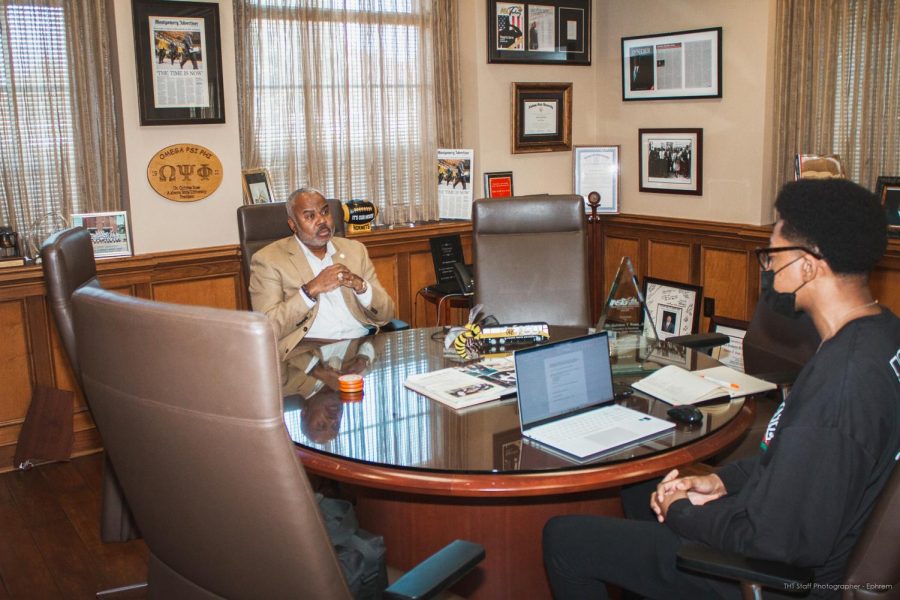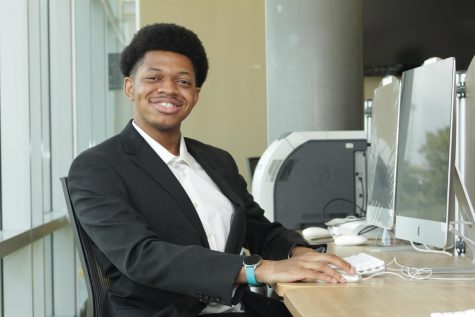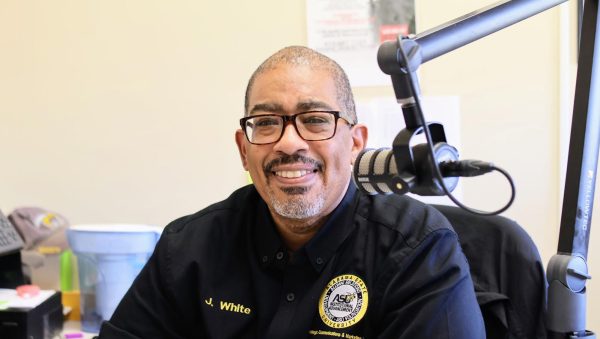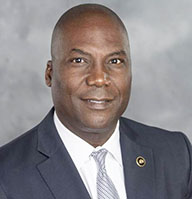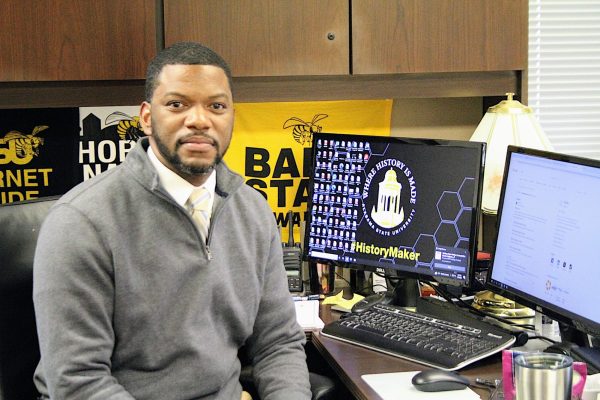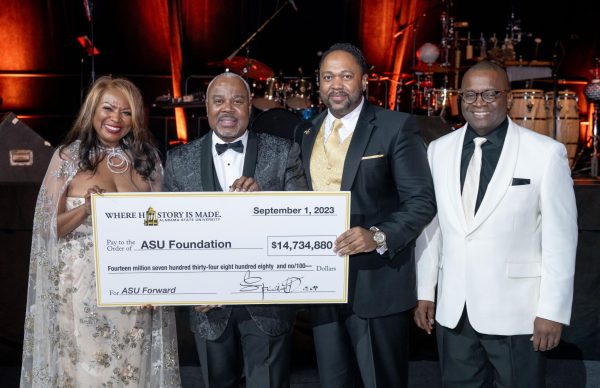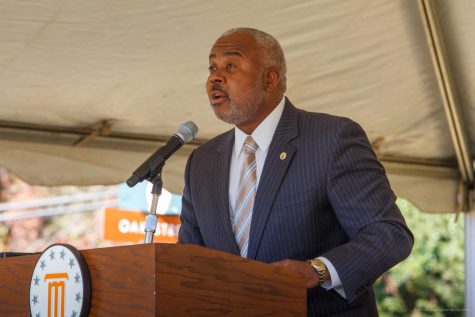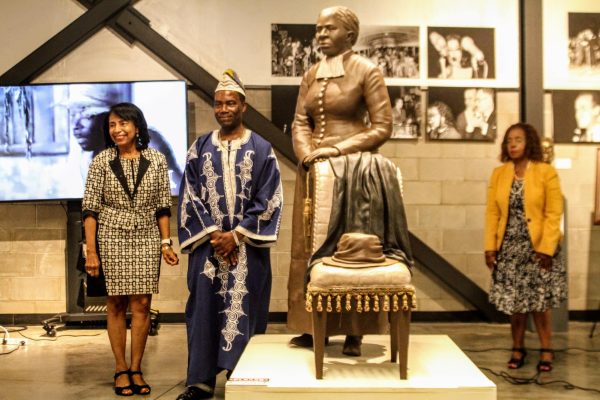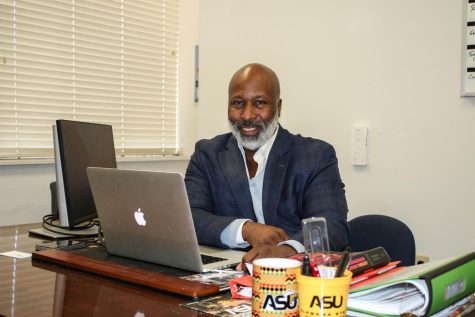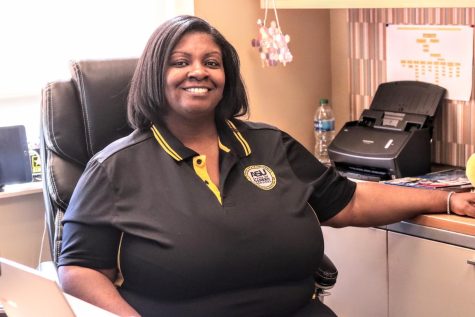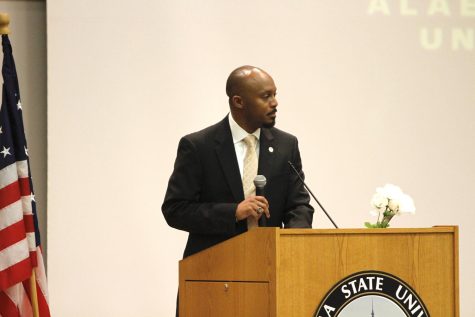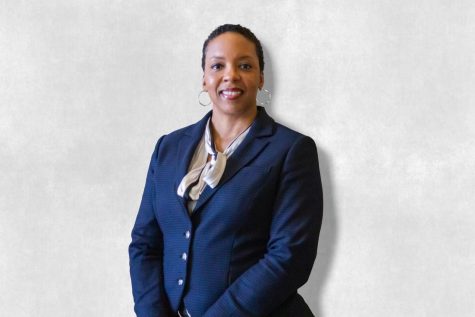After four years, Ross talks about his major accomplishments
Editor-in-Chief Micah Sanders takes a minute from his busy schedule to talk to the chief executive officer of Alabama State University President Quinton T. Ross, Jr., Ed.D., about his vision and accomplishments for the 154-year-old Alabama State University.
November 27, 2021
Editor’s Note: I sat down with President Quinton T. Ross Jr., Ed.D., to talk about his major accomplishments during the past four years.
Q. After holding various leadership positions, from the director of adult education at H. Council Trenholm State College to serving as a manager of UniServ for the Alabama Education Association, what convinced you to return to your alma mater as the 15th president?
A. “Well after much prayer, the opportunity became available, and of course, I have my terminal degree in education. I think that after all of the experiences that I have had, the trajectory was one of education and education-based. Being blessed to have the opportunity to come and serve as the 15th president, was just an opportunity that really, I tell people, was a godsend for me. And so with a lot of thought, a lot of prayer, I am blessed to be here. I tell people that being president is not a job; for me, it is a way of life. Of course, I spent much of my young adult life on this campus, and of course, because both my parents are graduates of Alabama State University, it is a legacy. It’s really a dream come true.”
Q. I saw that you received all three of your diplomas from Alabama State University. Was that intentional?
A. “It was. And I tell people all the time that it was not because I could not go anywhere else, I just did not think anybody could do it better. Actually, at the same time that I was elected to the Alabama State Senate, I was accepted to Auburn University to pursue a doctorate. But of course, the state capital is here [Montgomery]. So after thinking about having to be in the legislative session three months out of the year and driving back and forth to Auburn, it only made sense. We were in our second cohort of our own doctoral program here, and so that is what made me make the shift. And of course, it was the best thing that could have ever happened to me. So I was excited to be able to receive my doctorate here at Alabama State.”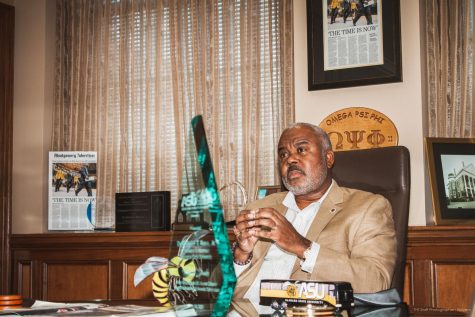
“I was a political science major with a minor in English. I came back under what they called the DeWitt Wallace Scholarship Program and got my master’s in secondary education English. As a matter of fact, one of our professors that encouraged me was Ralph Bryson, Ph.D., who is still living. I think Dr. Bryson is 99, but he was one of my mentors and advisers. I minored in English as an undergrad, and then that just parlayed into the ability to receive my master’s in secondary education, English and so that is the rest of my story.”
Q. Since your mantra is “Moving ASU 150 Years Forward,” what accomplishments do you feel you have made in the last four years regarding capital improvements on the campus (buildings, renovations, and restorations)?
A. “Well, when we arrived on campus back in 2017, it was no secret to anyone that we were lacking in deferred maintenance. A lot of things on campus that we already had were in need of improving or in need of repairing. I am proud of the team that we assembled under the direction of the Vice President of Facilities and Operations Donald Dotson. The approach that we have taken to get a handle on many of the deferred maintenance issues is plotting a path forward in how we want to maintain as well as plotting the vision forward on what we seek to accomplish. So we’re extremely excited about that.”
“Being a former high school principal, I tell people all the time that the interest in your school is the gateway to your soul. When you come onto campus, for the grass to be cut, trees to be trimmed, all of that makes a difference. And so I was really a stickler for that in my professional career. And when I came on campus, it was nothing short because I know how beautiful this campus is, and so that was one of the things that we wanted to make sure that we focused on. I think some of my colleagues and employees make it a point to make sure that when they’re cutting grass, they cut up under my window. So we’re extremely excited about that.”
“When you talk about paving roads and parking lots on this campus, the Acadome was built in 1993, I graduated in 1992. That parking lot in the Acadome had not been paved since then. 30 something years later, for us to partner with the governor, the Department of Transportation to get paving done on this campus, you may have seen the video with me dancing when they started doing the actual paving because that was huge. When you talk about the parking lot that was in back of Bibb Graves Hall, that was just gravel. And now you look at it. So we’re extremely pleased at those types of things.”
“When we came on campus, we were using a garbage truck and had employees picking up our garbage, but under the direction of Dotson, we outsourced that. And so now we have waste management that comes in and picks up the trash. So I can go on and on about capital improvement. The elevators in Dunn Tower were stopping and so we have had two of those elevators replaced. The elevator in the Acadome hadn’t been working in 12 years and so now it is working. Heating and cooling of the Acadome, which had been a major issue over the years, and we’re able to find solutions to do that through some heating and cooling towers that we have.”
“So continuous improvement is what we are all about. I tell people ‘We haven’t made it yet, excellence is what we strive for.’ And that’s why we try to work on all the various things and people have to realize that they call us Historical Black Colleges and Universities for a reason. Because when you talk about many of our facilities, they are truly historical. And so when you talk about trying to upgrade them, it takes some time and innovation. So we’re certainly excited about the things that we are doing and continue to do. We probably have about $11.5 million worth of projects that are in place. We received money from the Public Schools and College Authority (PSCA) from the state through a bond issue. We have a new track and field coming soon, we’re doing some renovations. If you have not noticed the new scoreboard in the Acadome. So there are a lot of things that we’re doing, but in the words of the students, ‘it’s a constant grind.’ It’s nothing that happens overnight. We went into a great partnership with Aramark, we’re doing some renovations there including the convenience store. And of course, on top of our Sting Shop, they’ll be building a restaurant. If you ride by the stadium, you’ll see them moving that earth right there to build a parking lot. Those are intentional things that we’re doing across campus. But all of it is systematic. It’s a slow grind. But we’re excited to see some of those things come to fruition.”
“Not to mention, how we’ve tried to encompass and keep this campus safe. We had to make some decisions to help with that because many of the incidents that happen on our campuses and I say ‘our campuses’ because I mean both the public schools and HBCUs are from outsiders. And so we have to find a way to secure our campus by them being public campuses as best as possible. So if you notice, we have a new guardshack out there. We have cameras all over the place that possess facial recognition as well as tag recognition. We decided to make our campus one way and all of that is in the spirit of keeping our campus as closed as possible for the benefit of the students. I cannot say enough about our students, faculty, and staff because everybody kind of bought into the direction that we’re moving in. And so we are excited about those things.”
“Additionally, if you look at Estell and I think King, they are repairing the roofs and so we will get brand new roofs on those buildings. We’ve done the floors in many of the buildings, so we are continuing to do that. So we just appreciate the patience and the understanding of our students as we continue to move forward.”
I know that it is a difficult decision to make regarding historical buildings and making sure they are up-to-date while keeping their history intact as well.
So, what is going on with Beverly Hall?
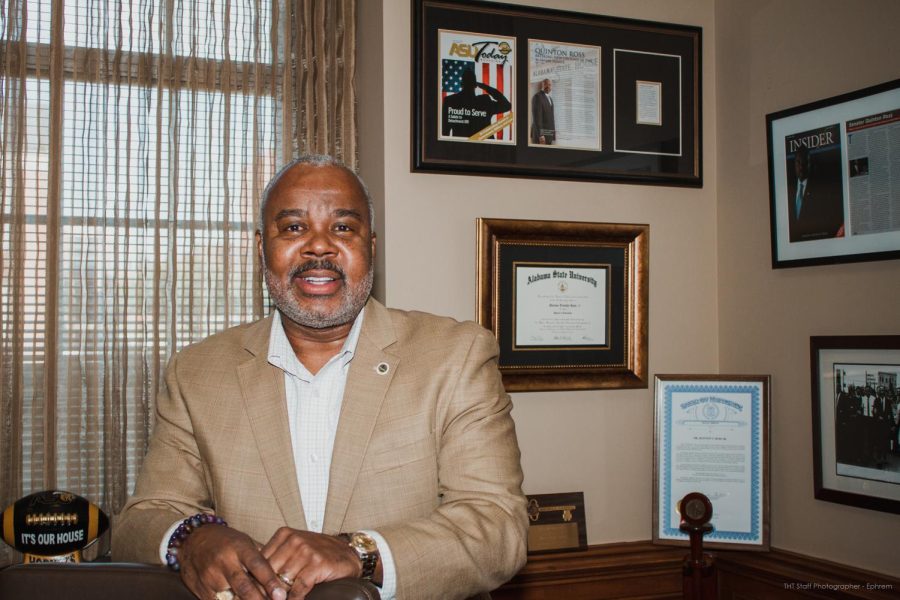 “Well, Beverly Hall is near and dear to me because that was my hall. I finished in political science, and so that is where political science, history, and social sciences were housed when I was in school. So I’m extremely familiar with Beverly Hall, but when I arrived on campus, the hall was shut down. So we’re excited that we’re going to begin to build that out. We are working with the Office of Academic Affairs to make sure that we can get our programs back in that facility and we are planning to bring that facility back online. But with everything that we have going, it is just a matter of time, but when the projects get started, that was something that we focused on immediately when we got here. So the plans are to reopen that facility that is near and dear to not only me, but a lot of the individuals that graduated. I think our students deserve an opportunity to have classes and activities in that facility.”
“Well, Beverly Hall is near and dear to me because that was my hall. I finished in political science, and so that is where political science, history, and social sciences were housed when I was in school. So I’m extremely familiar with Beverly Hall, but when I arrived on campus, the hall was shut down. So we’re excited that we’re going to begin to build that out. We are working with the Office of Academic Affairs to make sure that we can get our programs back in that facility and we are planning to bring that facility back online. But with everything that we have going, it is just a matter of time, but when the projects get started, that was something that we focused on immediately when we got here. So the plans are to reopen that facility that is near and dear to not only me, but a lot of the individuals that graduated. I think our students deserve an opportunity to have classes and activities in that facility.”
So now that the HVAC is done in Beverly Hall, what else is there to do?
“We have to build the walls back in there. It’s interesting, but we are going to get it done.”
What accomplishments have you made in the last four years regarding the university’s finances?
“Well, when I walked in the door in 2017, one of the things I wanted to do was get my hands around the finances that were at that time, really dismal. We were in a bad way. And so, interestingly enough, one of the first things I did in the first two months was recommend to our board of trustees that we refinance all of our bonds and under their leadership and their forward-thinking, they approved that opportunity for us. What that did was put us in a position where the bonds that we were paying on for all of the buildings and things that we have, we had a lot of varying rates, right? And we have some at 7%, some at 6%, some at 3%, but we were able to get all of our bonds about $148 million under 3%. So what that did was provide us some cost savings and over the life of that would provide us an opportunity of saving the institution about $10 million. OK, so we did that in 2017, the first three months of my presidency.”
“They had already approved a budget prior to me coming because I came in October 2017 but my CFO and my team looked and said, ‘Well, let’s see other places where we can cut and reduce costs.’ And so I charged my team with reorganizing their areas to make them more efficient, to double up on duties, if necessary, to provide cost savings. And so we were doing those things already, but also working with the Legislature, my former legislative colleagues, working to increase our budget allocation at the institution, but not just increase to spend, but to increase to save as well. And so we were working to increase our reserve. We are working with the board of trustees to pay off our line of credit to get us into a good fiscal position. And so we were working on all of that and then, of course, COVID.”
“But even in a bad situation, you have to look at the blessings because when they sent out the first CARES Act, which I advocated, they forgave $1.3 billion in debt from those who were members of the HBCU Capital Finance program, so that is what I did not mention. The HBCU Capital Finance program was what I recommended to the board that we get involved in, in order to bring down the rate of our bonds. And so we got in that program and we did that. But, by virtue of being one of 40 institutions that were in partnership with the HBCU Capital Finance program, which is a program through the federal government under the Department of Education, when they put that $1.3 billion there, we benefited from the forgiveness.”
“I’ll never forget having a conversation with U. S. Senator Tim Scott, who was kind of leading the way dealing with the CARES Act and working with our Congresswoman Terri Sewell and Sen. Richard Shelby, all of our congressional leaders. And lo and behold, they forgave that debt. And so we were wiped clean of about $138 million worth of debt here on campus, which actually just left our stadium to be paid for. And so that is a blessing. And so with that, we are able to focus on the stadium and paying that down and getting that paid for. And then again, ensuring that fiscally we are sound. And so we are excited about that and just being fiscally responsible again, working with our legislature to make sure that we still get the proper funding and being intentional about making sure that the future of Alabama State University is bright fiscally. And so we are extremely proud of that. So while we benefited from COVID, you have to remember now in 2017, we had to have the forethought to get involved in the program, because had we not got involved in that program, we wouldn’t have benefited.”
How have you worked to improve academic expansion during your last four years as president?
“Our academic affairs area has been working extremely hard, because one of the things that we wanted to do was take an assessment of the overall academic enterprise here. You have to look at the programs that you have, and you have to look at the programs that are not working. You also look at the programs that may be working and need a boost. So they have undertaken a viability study here on campus. With the leadership of our provost, Carl Pettis, Ph.D., and his assistant provost, Tanjula Petty, Ed.D., and others, we have undertaken a viability study, which gives us that benchmark of what programs we need to keep and what programs that need to go. And out of that comes the recommendations that we will make. But then, we also need to see what programs we need to expand on and grow. One of the things that we have approved is a MBA program, a master’s in business administration. We have been approved by the Alabama Commission of Higher Education, better known as ACHE. And so we are moving forward with that program. We are also looking at other programs to expand. And sometimes you have to look within the curriculum, the classes that you have, and a lot of times it is just kind of modifying, but that’s an ongoing process and something that is happening on a regular basis. There are so many processes and procedures that you have to go through, but we are always looking for ways to improve.”
“We are going through an exercise now with a consultant on some programs that we can expand and how we get there. But when you talk about our health sciences programs, when you talk about our computer information systems, I mean, all of those areas are areas of growth. And so through our partnership with so many different corporations, we’re trying to provide opportunities for our students, not only in the classroom, but on the career track. Sabrina Crowder, Ph.D., who is our career services director, is doing a phenomenal job of connecting students with various internships. So we are laser-focused on improving and expanding programs where we can and providing opportunities for students.”
“Forensic science, I mean when you look at the programs that we have here on campus, they’re amazing. Our dance BFA program, they are amazing. So we just have so many programs and so we do what we can to make sure that they have the resources that they need to expand as we grow and to expand also our online offerings. I think COVID helped, we were moving in that direction, but it did help get us there a little faster so that we can have a robust online program as well. And so all of those things are working simultaneously here on campus, and we’re just excited about it. So our academic affairs, under the leadership of Dr. Pettis, have been phenomenal.”
I have spoken to several students and faculty about the desire of students to have an African American Studies major. What are your thoughts on that?
“Well with any program, it all falls on viability. There is a lot of work that has to go into it. But surely if that is something that they want coming through academic affairs and you can show the need and the viability, then possibly. But it is easy for somebody to say they want a new major but there are steps that you have to follow to do that. But I call Alabama State University the epicenter of civil rights. I mean, we have such a rich history here. So, why not? But we have to have the need and the desire and people have to really be involved in the major to make that happen. So I am not opposed, but I cannot deliver it without the necessary steps being taken and individuals pushing it forward. So you always have to match your resources with your desire.”
What accomplishments have you made in the last four years in terms of student development?
“We have our new vice president of student affairs and enrollment management, Dr. Derrick Brewster, Ed.D., and in just a few months, he has done a phenomenal job. Our vision is to create a robust area to provide and improve the student experience, because that is what college is all about. When I was here at college, I had a phenomenal time. You all have much more than what we had. But at the time that I was here, we had individuals that were engaged that provided an experience of a lifetime here on campus. So I think making sure that we have individuals in place with the proper programming, looking at all of the opportunities that we can provide for students. So it is kind of a two-way street because students have to be engaged too. So if there are events where only five or six students show up, that does not mean that we do not do it. So I think working with the various committees, working with Brewster and his team, that you will see us expand on the kind of experiences that we can provide for our students.”
“That goes into our Quality Enhancement Plan (QEP) to see what the student’s first-year experience is like. But that all should be rooted in understanding the purpose here at Alabama State University and what they seek to get out of it, as well as what they seek to give back to the institution. So all of those areas have to have to work together. No one can work in a silo. And so the student experience comes from a lot of different areas. And I think that over the last few years we have done a fairly good job at the experience. I mean, you go back to COVID, we were the only college in the country that had two concerts doing COVID. But when you look at the programs and you look at the activities that we were able to have through COVID. I challenged each administration to think outside the box, but also think with safety in mind. And so all of those entities, everybody working together, provides for a vast student experience.”
“And then I will go back to those career opportunities and exposure opportunities. I mean, listen, we partnered with a company, Dragonfly. Do you realize that we have a drone pilot program going on right now? We have a few students that are learning how to fly a drone. And when they finish the drone program, they will be allowed to take the FAA 107 test. And so that is something that we piloted and partnered with Dragonfly to give students an opportunity to expand. When you look at the opportunities individuals have to go to NASA and then we have had somebody go down to the Tyler Perry Studios. I think those are opportunities. And again, that is a part of the student experience. And so, when you look at the Greek life on campus and of course, I’m an Omega, but I expect a lot from our Greeks on this campus. I’m a former SGA president, I expect a lot from our student leaders. So I know what it is to have to talk about a robust student experience. And that is why I am always open to new ideas as long as it makes sense, as long as you can keep it safe. I try to do what I can to support it. I have to take hats off to my leadership team, individuals in position, I have to take my hats off to the faculty and staff with their vision to expose our students to a lot of different things. All of that makes for an amazing student life here at Alabama State.”
What legacy did you want to leave Alabama State University?
“I want to leave Alabama State University better than I found her. So when you reflect on all of the ebbs and flows that the university has gone through, I want to make sure that she is left on an outstanding financial footing. I want to make sure that our reputation not only in the city, in the state, but nationally is one of high acclaim. And I also want to make sure that the student experience on this campus is one where when the students walk off this campus, they too feel and live Alabama State University. I tell people that between the good Lord, my parents and Alabama State University, they are responsible for all that I have. And when students walk across that stage, you cannot forget that. Because I tell people when I drive my car, I should say, ‘Thank you, Alabama State.’ When I walk up and put my debit card in the teller, I should say, ‘Thank you, Alabama State’ because it provided me with the opportunity that I have today. So that’s the legacy I want to leave and I want people to know that when they come here, they will have the experience of a lifetime.”
With a 1991 Yearbook opened to the SGA Executive Officers, Ross expounds upon his time as SGA President.
“I keep it to this page because it’s a constant reminder of what my position here at Alabama State University is all about – the student experience. Ok. This is Cheryl Strange. She was Miss ASU. She is a medical doctor from Alabama State University. George Eric Harrison, his son, is a student here, was my vice president. He’s a medical doctor and a chief executive officer of a hospital in Georgia. Rhonda Robinson is an educator in Georgia. Douglas Barringer is an administrator at a community college in Dubai.”
“So my point to young people who come here, you can come here, get everything you need to become anything that you want. And we are just a broad brush of individuals that have come and are successful. When I sit in the room and I say ‘I am a graduate of Alabama State University,’ and people may have their ideas about Alabama State, but when I open my mouth, they see it.”
“When I was in SGA learning parliamentary procedure, when I walked down the halls of the Alabama State Senate, it was all the stuff that I learned from Alabama State. But all of these experiences helped shape, expose, and prepare me for the various journeys that I have had. So my trajectory to the presidency has been phenomenal.”
Ending the session, Ross once again praises his students, faculty, staff and alumni for keeping ASU close to their hearts.
“I cannot reiterate how proud I am of the students, the faculty, the staff, and the alumni. I am just proud. You all make me proud. You all have embraced even through the most critical time. And that is why when people were saying, ‘Well, do you open or do you close?’ Our institutions are here to teach and show. So when you go out into the world, you will be prepared. So for you all to come back, embrace our protocols, embrace our testing, embrace being able to be vaccinated. I mean, all of those and every college doesn’t have it. That’s a whole other story. We can talk about how we were able to become one of the first institutions of the state, number one, to become a testing site, let alone become a vaccination site. We’re known nationwide for what we’ve done on this campus. We’ve been able to keep our campus with faculty, staff and students at a less than 1% positivity rate.”


